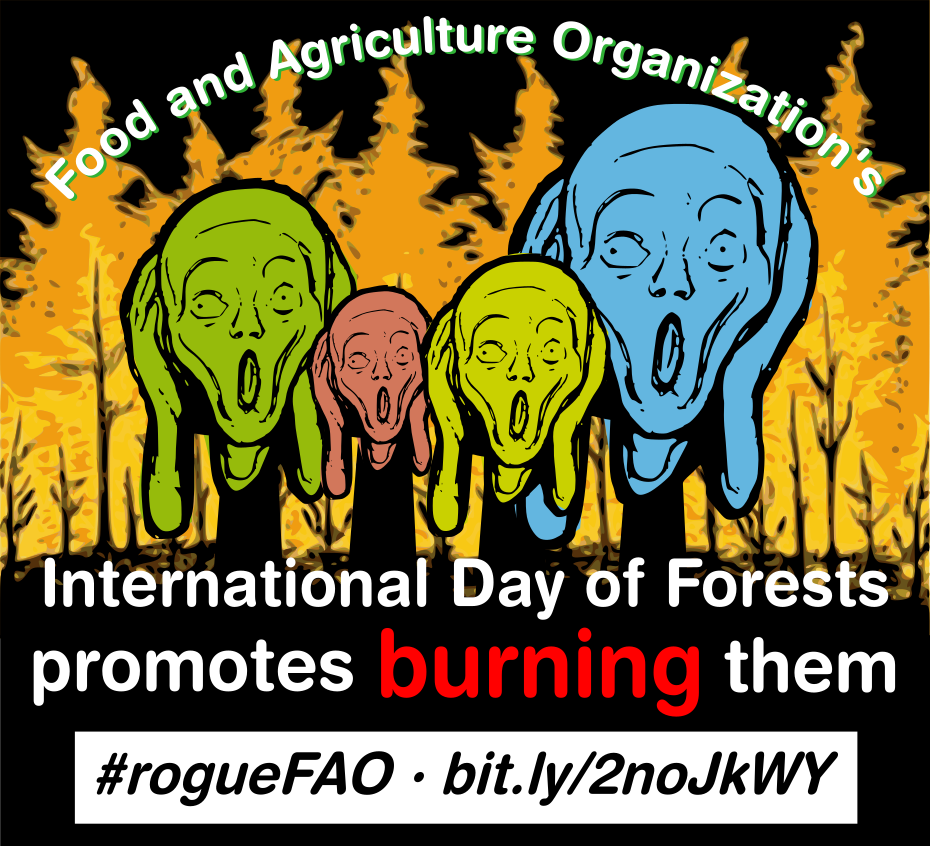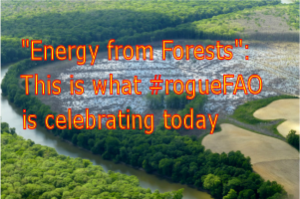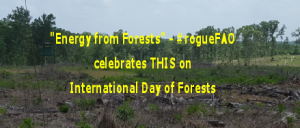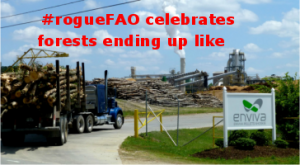 La versión en Español de esta página web estará disponible próximamente en www.biofuelwatch.org.uk/2017/fao-día-Internacional-bosques
La versión en Español de esta página web estará disponible próximamente en www.biofuelwatch.org.uk/2017/fao-día-Internacional-bosques
21st March has been declared International Day for Forests by the UN. Shockingly, the UN’s Food and Agriculture Organisation (FAO) has decided to mark the day by promoting “Forests and Energy”, i.e. wood-based bioenergy, despite its well-documented harm to forests worldwide.
This is a collaborative webpage by Global Forest Coalition, Timberwatch, Biofuelwatch, International Tree Foundation, and Dogwood Alliance.
Suggested social media messages to FAO
Open Letter to FAO by civil society organisations
Joint statement by Global Forest Coalition, Biofuelwatch, Timberwatch, Dogwood Alliance, Global Justice Ecology Project, and International Tree Foundation
Other civil society actions on International Forest Day
Selected resources on wood-based bioenergy
Suggested social media messages to FAO
[ngg_images source=”galleries” container_ids=”43″ exclusions=”375,370,380,153,190,194,210,211,213″ display_type=”photocrati-nextgen_basic_thumbnails” override_thumbnail_settings=”0″ thumbnail_width=”150″ thumbnail_height=”150″ thumbnail_crop=”1″ images_per_page=”20″ number_of_columns=”3″ ajax_pagination=”1″ show_all_in_lightbox=”0″ use_imagebrowser_effect=”0″ show_slideshow_link=”1″ slideshow_link_text=”[Show as slideshow]” order_by=”filename” order_direction=”ASC” returns=”included” maximum_entity_count=”500″]Suggested hashtag: #rogueFA
Sample Tweets to go with the pictures:
- Sad: Today #rogueFAO celebrates cutting burning forests in power plants @FAOForestry #biomass
- #rogueFAO greenwashes companies that cut down and burn forests for energy @FAOForestry
- #rogueFAO stop greenwashing forest destruction for #biomass energy
- .@FAOForestry Please think again on #IntlForestDay #rogueFAO
If you like, you can also put eubioenergy.com/ as a link in your tweets, since the Open Letter to the FAO will be published there, too.
And here are photos taken by Dogwood Alliance with messages to FAO added:
Open Letter to FAO by civil society organisations
The letter is also available at eubioenergy.com/2017/03/21/open-ngo-letter-on-faos-international-day-of-forests-2017/
Joint statement by Global Forest Coalition, Biofuelwatch, Timberwatch, International Tree Foundation, Dogwood Alliance, and Global Justice Ecology Center
The theme “Forests and Energy” chosen by the UN Food and Agriculture Organization (FAO) for this year’s International Day of Forests on 21 March, is dangerous and misleading. It is a barely concealed advertisement for the bioenergy industry, and shows a naked disregard for international efforts – including its own – to promote sustainable development and tackle climate change. It represents a bonfire of science and nature in which only Trump and his collaborators would find comfort and warmth.
The FAO highlights the fact that people around the world have long relied on wood for basic cooking and heating needs. But it then further presents modern industrial bioenergy – which includes the conversion of large coal fired power plants to burning wood, as well as the proposed used of wood based biofuels for transportation and aviation – as a natural extension of those long-held traditional wood use practices. Conflating traditional and modern industrial uses of wood bioenergy is disingenuous and undermines the thoughtful consideration that is required to develop energy and other policies that will protect forests, people and the planet.
Modern industrial scale wood bioenergy is supported by lucrative subsidies as a “renewable” alternative to coal or other fossil fuels. It is falsely referred to as “carbon neutral” in spite of clear evidence to the contrary indicating that burning wood releases even more carbon emissions upfront than the fossil fuels it is supposed to replace. Industrial scale wood bioenergy requires such vast quantities of wood that demand can never be met “sustainably”. As one example, the DRAX coal plant in United Kingdom, which is converting to burn wood, with generous government subsidies, requires the import of more than 12 million tonnes of wood pellets annually – more than the total wood production of the UK. (see biofuelwatch.org.uk/axedrax-campaign/) .
Demand for industrial scale wood-based bioenergy is already escalating deforestation and the conversion of native biodiverse forests into industrial monoculture tree plantations for “biomass production”. In some cases these directly displace people and compete with traditional uses for forests. Tree plantations are being actively subsidised and otherwise promoted as a preferred convenience for the wood products industries, including for wood-based bioenergy, but bear little resemblance to genuine forests. Instead, they tend to have significant negative impacts on biodiversity and rural communities. FAO, in spite of ongoing civil society pressure, continues to refer to them erroneously as “planted forests”, while civil society refers to them rather as “green deserts” or “fake forests”.
By offering forests as a source of “renewable” energy and failing to differentiate between native biodiverse forests and monoculture tree plantations, the FAO appears to be paving the way to meet the demands of energy and forest product industries at the expense of protecting forests and human rights. That does not bode well especially given FAO’s key role in setting the agenda and particularly the target indicators related to sustainable forests and mountains, and land degradation, under the Sustainable Development Goals in Agenda 2030.
The FAO promotion of “forests as energy” is grossly inappropriate coming from a “food and agriculture” agency. It is also badly timed, given that we are squarely faced with the dual crises of biodiversity loss and climate change, and we know that forests left intact and growing rather than being burned for energy can play a vital role in averting these crises.
Other civil society actions on International Forest Day
+ An Open Letter signed by over 200 civil society organisations has been handed over to representatives of the FAO. The letter, which was coordinated by the World Rainforest Movement, urges FAO to change its forest definition, which allows industrial tree monocultures to be considered forests. This misleading definition if helping to facilitate the highly destructive expansion of monoculture tree plantations worldwide: wrm.org.uy/highlighted_post/support-the-letter-urging-fao-to-revise-its-forest-definition/ . See here for a blog article about the hand over of the letter at a meeting in Chile: www.biofuelwatch.org.uk/2017/chile-tree-plantation-meeting/.
+ Plantation Definition Discussion: An interactive website has been set up for articles and other contributions about the impacts of the FAO’s definition of industrial tree plantations as forests and about the impacts of such plantations: plantationdefinitiondiscussion.wordpress.com/
+ Briefing released by Timberwatch and World Rainforest Movement: “Industrial Tree Plantations INVADING Eastern and Southern Africa”. This report covers 11 countries in a part of Africa where tree plantations have already had a long presence thanks to the influence of colonial powers, but now there is a new wave of foreign interest in Africa’s land and water resources, which threatens to cause more harm to local communities and to the environment. Portuguese (Mozambican) and Kiswahili translations will be released shortly after 21st March: timberwatch.org/
+ Global Forest Coalition publishes its Forest Cover newsletter edition “The Burning Issue”, which focuses on the loss of the world’s forests to fire, not only because of our changing climate, but also because of the increasing prevalence of highly flammable monoculture tree plantations that dry soils out, the deliberate burning of forests to create croplands and pastures for livestock, and plans to turn vast amount of lands over to growing trees to burn in industrial quantities to generate electricity in the Global North: globalforestcoalition.org/forest-cover-52/
+ Dogwood Alliance has released the report “The Great American Stand: US Forests & The Climate Emergency”, co-authored by climate change scientist Dr William Moomaw and Dogwood Alliance’s Executive Director, Danna Smith. The report calls for a massive scale-up in forest protection in the US: dogwoodalliance.org/2017/03/media-release-the-great-american-stand-us-forests-and-the-climate-emergency/
+ The Belgian action group Field Liberation Movement (FLM) has published a new animated video that explains the flaws behind the GMO poplar tree field trial taking place in the Flemish countryside. The GM poplars have been modified to be weaker, as researchers hope this will enhance their ability to serve as raw material for biofuels. The Flemish Biotechnology Institute (VIB) has applied for a patent on numerous tree species with this characteristic. The VIB is publicly funded, however it has multinationals like Syngenta, Bayer and BASF in its governing bodies: youtube.com/watch?v=eBDKXMqDAQo
+ Members of the Campaign to STOP Genetically Engineered Trees from around the world have gathered in Chile for two weeks to investigate the impacts of industrial tree plantations and the potential future impacts of genetically engineered tree plantations–including increasingly severe wildfires, expanding desertification, toxic contamination, and land grabs from Indigenous and forest dependent communities: stopgetrees.org/category/chile-blog/
Selected resources on wood-based bioenergy
A long list of scientific studies, letters by scientists, and civil society reports and briefings is available at biofuelwatch.org.uk/biomass-resources/resources-on-biomass/ . Below is a short selection of some of those studies and reports.
+ Energy and forestry companies benefit from the FAO’s forest definition, which includes monoculture tree plantations. Thanks to that definition, they can get away with claiming that a clearcut forest can be “replaced” without any long term carbon losses by planting new trees in monoculture plantations. A recent article published In the science magazine Nature Environment & Ecology explores a key reason why monoculture plantations sequester far less carbon than biodiverse forests, March 2017
+ Report by the independent think tank Chatham House,published February 2017: The Impacts of the Demand for Woody Biomass for Power and Heat on Climate and Forests, Duncan Brack, Chatham House
+ Bioenergy in the EU, report by Hands off the Land and Transnational Institute, December 2016
+ The Black Book of Bioenergy, BirdLife Europe and Central Asia, together with Transport and Environment, November 2016
+ Presentation about the carbon impacts of bioenergy by Timothy Searchinger, Princeton University, May 2016
+ Biomyths – The costly carbon scam of Bioenergy, Global Forest Coalition, December 2015
+ Up in Flames: How biomass burning wrecks Europe’s forests, Fern, November 2015
+ Bioenergy threatens the heart of North American wetland forests, Natural Resources Defense Council (NRDC), October 2015
+ Bioenergy Out: Why bioenergy should not be included in the next EU Renewable Energy Directive, Joint briefing by NOAH (Friends of the Earth Denmark), Biofuelwatch, Econexus, Global Forest Coalition, World Rainforest Movement, Rettet den Regenwald e.V./Rainforest Rescue, and Corporate Europe Observatory, September 2015
+ Biomass Sustainability Standards – a Credible Tool for Avoiding Negative Impacts from Large-scale Bioenergy?, joint briefing by Biofuelwatch, Global Forest Coalition and Econexus, 2014
+ Biomass: The Chain of Destruction, Biofuelwatch report, including the case report Plantations for Energy: A Case Study of Suzano’s plantations for wood pellet exports in the Baixo Parnaíba region, Maranhão, Brazil by Ivonete Gonçalves de Souza from CEPEDES and Winfridus Overbeek from World Rainforest Movement, October 2013
+ Large-scale bioenergy from additional harvest of forest biomass is neither sustainable nor greenhouse gas neutral, Ernst-Detlef Schulze et al, April 2012
December 2015



